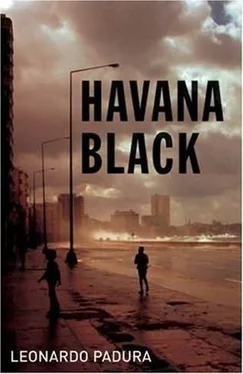Andrés’s confession killed off the impact of alcohol on the Count’s brain. An unhealthy lucidity spread through his mind, placing a question mark over his own life, now reflected in the mirror of Carlos’s life, which he intended to write up, and Andrés’s, which Andrés himself had just outlined: his own frustrations took on a sharper relief in the light of his friend’s words, and the Count totally understood why he had left the police: he needed to escape, even though he was incapable of changing location. Too many nostalgic memories tied him to the house where he was born and lived, to the neighbourhood where he grew up and where his father and Grandad Rufino grew up, to the friends he had left, whom he could never abandon, to certain smells and plagues, to many fears and epiphanies: his anchor was fixed in such a way he almost didn’t need to know how it was secured: he simply possessed irrevocably a physiological need to feel that he belonged in one place.
The bitter burden of Andrés’s words had decreed an end to the fiesta, and the break-up began, sadly and with everyone feeling they’d experienced something final and beyond appeal. Today it could be Andrés’s departure, tomorrow it might be the death of Carlos, sentenced to his infamous wheelchair; another day would bring Miki’s betrayal, another Rabbit’s lunacy till they reached the apocalypse, he thought, as Tamara’s car advanced along Santa Catalina on the way to her house. The Count, who had so wanted her to ask him to provide the company he longed to give, was hardly surprised when she said: “Will you come home with me?”
“Of course,” he’d answered, convinced Andrés was provoking all this, and not entertaining the possibility that Tamara might have wanted it long ago, perhaps even as much as he had.
The wind had risen with nightfall and an opaque drizzle hit the car windscreen, blinding the couple’s vision.
“The world is coming to an end.”
“Or already has,” she corrected him, turning the car towards the garage entrance.
“I’ll open up,” he offered, stepping out into the rain and out of the way of the car, which shone the full beam of its headlights on the amalgam of shapes that recalled Lam’s and Picasso’s bestiaries, hybrid animals, ready to leap, terrified by the machine bearing down on them.
“Did you get very wet?” she asked, getting out of the car after she’d locked its doors.
“Hardly at all.”
“Come in, I’ll put the coffee on,” she suggested as she opened the door to her house.
He recalled the last time he was there: that morning they’d made love with the fatal sensation that a divergent past had come between them, along with a future in which it would be difficult for them to get along: because nobody loved a loser, because she’d be unable to share his sad policeman’s life, because he’d never overcome the phantom of a dead husband called Rafael Morín asleep, perhaps, between their bodies, he thought that day, and today, too, when he wondered why he was there, although he knew the answer.
Tamara returned to the living room with two cups and settled down on the sofa, very close.
“Why didn’t you ring again, Mario?”
He smiled and sipped his coffee.
“Just what I was thinking… Because I thought it best for you.”
“But you never asked me my opinion.”
“I thought I was right.”
“Perhaps you were wrong.”
“You reckon?”
“I said perhaps…” and she took a sip as well.
He looked at the huge house and supposed she left her son at his grandmother’s. Everything in that house could be for him, that night, to round off his birthday.
“I was probably wrong, as usual. But the fact is, Tamara, I don’t want to fall in love. And even less so if it’s with you…”
“Why?”
“Because I’ve already fallen in love once. Because I only suffer afterwards… and because I start singing boleros.”
“Don’t fuck around, Mario.”
“I swear I do.”
He thought he must protect himself, because he liked that woman and her coffee too much, and worst of all she knew it, he also thought, looking into her eyes that were still moist, at the shape of the breasts he’d once kissed, and now tried to remember her naked, as he’d had her that day he consummated the dream he’d postponed for fifteen years. But something missing between his legs told him it had been a very long day too over-burdened with reminiscences for him to try and finish on a glorious note, when he would no doubt have to show off his panoply of amatory skills. So, with a heavy heart, he stood up and finished his coffee, then put his cup on the table in the middle of the room.
“What’s the matter, Mario?”
“I’ll try to explain: I really like you a lot, more than anyone else, I love going to bed with you, I’d even marry you in church and I’d like to have eight children with you, but today is a bad day. A hurricane is on its way… What Andrés said has knocked me out. Just imagine, if he thinks that about his life, what can I say about mine? That’s why I’d better go… Can I come back another day?”
She nodded and a lock of hair fell impertinently over her eyes.
“In ten years’ time?”
“Or ten hours.”
“Better make it ten hours… or I can’t guarantee a thing,” she replied, standing up. She also put her cup on the table and without further ado applied her mouth to the Count’s and stuck her torrid tongue between his teeth. When he could eventually speak, the Count looked at her.
“Thanks for the invitation. You bet I’ll come, and the first thing I’ll do is sing you a bolero.”
“Don’t be so stupid, Mario: don’t you realize that I’m alone, that I need you? You should try to be a little less selfish and put yourself in other people’s shoes. Then you wouldn’t have been so surprised by what Andrés said… You aren’t the only one who is fucked. I’m telling you that I need you and – ”
“Don’t talk that way, Tamara: I’m not used to anybody needing me. Not even myself.” Now he was the one kissing her, with the brevity demanded by a farewell as necessary as it was undesired. “Don’t worry. I’ll be back tomorrow. After the hurricane has come and gone.”
As soon as he set foot in the street, he was convinced he’d made a mistake, as usual, and should run to the tree of self-flagellation in order to whip his buttocks. The taste of ripe fruit that Tamara’s breath had left in his mouth was something sustained and tangible, like the feel of her breasts against his chest: he was going, leaving behind him a woman full of longings, who even said she needed him, only to meet the sodden hostility of rain and wind, as he floated his melancholy on the air and wondered how many more times he would get it wrong in life. Every time. Now, he told himself, he needed to see the hurricane come and go, to see whether the devastation it wrought would create a new face to pitch against such a vision of failure and frustration and grief and gloom. His whole body soaked by the rain, its force lashing his arms and face, the Count ran down the centre of the street, feeling the rain and air purifying him in those early hurricane hours that were to mark the first day of his new life. As he ran, he realized that the speed was causing his body to abandon his soul, always so ponderous and pretentious, which now chased after him in vain. A strange sensation of purity and total freedom began to flow through him, after so many attempts, ideas, plans and desires to feel free. He ran down the lonely street, savoured the rain racing down his cheeks, broke through the air with his chest, refusing to think: wanting only to wallow in that freedom, but his brain denied his wish and he had to think. And he thought: I’m not the same person anymore. Anymore?
Читать дальше











